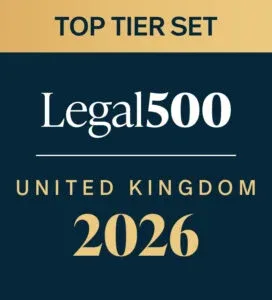Local Authority SEN duties during the Pandemic
With families under strain during the ongoing pandemic juggling home working together with childcare responsibilities. The Secretary of State for Education Gavin Williamson earlier this month issued a further notice as per The Coronavirus Act 2020 modification of s.42 of the Children and Families Act 2014 (England) Notice 2020. This being a modification notice in respect of the duty relating to a child or young person’s education, health and care (“EHC”).
This notice specifically amends the absolute duty placed on local authorities as per s.42 Children and Families Act 2014 which says that where a local authority maintains an EHC plan for a child or young person it must secure the specified special educational provision for the said child or young person. Whilst the aforementioned modification notice is in force local authorities are able to discharge this absolute duty so long as they use reasonable endeavours. The rationale behind the modification notice being that the changes are necessary due to reduced staffing during the pandemic. For children who are unable to attend school during the pandemic a local authority cannot reasonably be expected to continue to deliver the level of education as received at school. Further even when children are attending school social distancing has made the provision of the previous level of education very difficult and in most cases an impossibility.
The statutory duty as found at s.42 Children and Families Act 2014 ensures that local authorities must secure special educational provision as set out at Section F of the EHC plan and for the relevant clinical commissioning group to arrange any necessary healthcare as per section G of the EHC plan. The duty does not apply in cases where parents arrange private education on behalf of their child.
The modification notice does not remove the statutory duty for any local authority or clinical commissioning groups under section 42 of the 2014 Act in that they must use ‘reasonable endeavours’ to secure the specified special educational provision so as to discharge the absolute duty. Clearly statutory bodies must consider for each child and young person with an EHCP what they can reasonably provide in the circumstances during the period the modification notice is in force. Blanket policies to reduce EHC provision which results in failing to meet a child’s needs could well lead to a local authority being vulnerable to a claim for judicial review.
In terms of any requests for a need assessment local authorities should not down tools and should continue to consider any requests for a needs assessment for education and health care, in addition to considering the views of the parents together with those of the child or young person.
This modification notice is set to expire on 31 July 2020 when the absolute duty as per s.42 Children and Families Act 2014 is set to return. It remains unlikely that the Secretary of State for Education Gavin Williamson will issue a further modification notice following the end of this month. As the stated policy of the Government is that all children in England including those with special needs should return to full time education in Septmeber. Once the absolute duty returns the position reverts to that as previously and as per R (N) v North Tyneside [2010] EWCA Civ 135 in which Sedley LJ held that:
17. There is no best endeavours defence in the legislation. If the situation changes there is machinery for revising the statement, but while it stands it is the duty of the LEA to implement it. In a margin of intractable cases there may be reasons why a court would not make a mandatory order, or more probably would briefly defer or qualify its operation.
Special Educational Needs and Disability (Coronavirus)(Amendment) Regulations 2020 “The Amendment Regulations”
The above “Amendment Regulations” came into force on 1 May 2020 and apply until 25 September 2020. The Amendment Regulation amend all four sets of statutory Regulations which provide the timescales in relation to EHC assessments and plans. These amended regulations include The Special Educational Needs and Disability Regulations 2014 (S.I. 2014/1530), The Special Educational Needs (Personal Budgets)Regulations 2014 (S.I. 2014/1652), The Special Educational Needs and Disability (Detained Persons) Regulations 2015 (S.I. 2015/62), The Special Educational Needs and Disability (First-tier Tribunal Recommendations Power) Regulations 2017 (S.I. 2017/1306).
The Amendment Regulations extend the existing time limits in relation to EHC assessments and plans as set out within aforementioned sets of statutory regulations. Where it is not reasonably practicable to meet any time limit due to reasons related to the coronavirus pandemic. Where it is not possible to complete an EHC process within the prescribed normal time limit it must be completed as soon as practicable or in some instances as soon as reasonably practicable.
The Government has issued statutory guidance which explains how the amendments to the law in relation to EHC plans and assessments work and which says that:
Guidance
- To illustrate how the amendments to the law work:
- where a local authority has decided that it is necessary to issue an EHC plan following an EHC needs assessment the duty has been to do so as soon as practicable but in any event within 20 weeks of an initial request. The Amendment Regulations provide that if the incidence or transmission of coronavirus (COVID-19) makes it impractical for the local authority to do so within the 20 weeks they must discharge their duty to do so as soon as practicable
- where a request is made to a local authority to re-assess educational, health care and social care provision, the duty has been to notify the child’s parent or the young person whether or not it is necessary to reassess the child or young person within 15 days of the request. The gloss to the duty in Regulation 2A of the Amendment Regulations, that changes the way in which the provision should be read, applies here. It means that if it is not reasonably practicable to complete this process within the 15 days because of the incidence or transmission of coronavirus (COVID-19), the local authority must do so as soon as reasonably practicable
Full details of the changes to the timings of processes relating to EHC needs assessments and plans can be found at Annex A: details of the amendments to the existing Regulations which accompanies the Government’s statutory guidance. For further details please see:
These changes are not permanent but temporary and whilst there is considerable flexibility in terms of time scales these are only to be amended in cases where it is not practicable or reasonably practicable for a local authority or NHS clinical commissioning group to comply with any time limit due to the incidence or transmission of coronavirus. This being due to reasons related to the ongoing pandemic and further the relevant statutory bodies should still complete the EHC processes as soon as possible.
Whilst local authorities must of course continue to consider requests for EHC needs assessments and final EHC plans must continue to include all the relevant advice and information. Reviews of EHC plans should also continue to take place in accordance with the flexibility around timings. The Amendment Regulations whilst amending the timescales for EHC processes do not permit local authorities to disengage from statutory process but merely permit greater flexibility in terms of doing so. As such any local authority must still consider requests for new EHC needs assessments or reassessments and any authority not to do so would be at risk of a claim for judicial review.
What constitutes reasonable endeavours?
The statutory guidance provides a helpful framework to assist local authorities as to what comprises reasonable endeavours in any individual case and says that:
The framework acknowledges that what constitutes reasonable endeavours will vary according to the needs of each child and young person and the specific local context. In deciding what provision would be required, it might be appropriate to consider the questions listed below:
What?
Securing something different to the provision stated in the plan, for example in relation to availability of staff, availability of technology and any significant risk that may cause harm
Where?
Location where provision is to be provided may be altered, for example early years provider, school, college, community setting, home or clinic
How?
Frequency and timing of provision may be altered or modified in the light of available staff and risks that may cause harm
When?
Method of delivery may be altered, for example virtual rather than face-to-face and smaller rather than larger groups for teaching (where this can be done following the guidance on reducing transmission of coronavirus (COVID-19))
By whom?
Changes to the person delivering the provision, for example a learning assistant under virtual supervision rather than a specialist therapist or teacher.
It is of course unlawful to fail to comply with any EHC time limits unless permitted to do so by the Regulations. Any delay to a child or young person’s EHC needs assessment by way of a blanket approach is likely to be unlawful and vulnerable to challenge. Parents also still of course have 15 days following service of any draft EHC plan to make representations as to its content and request a particular school is named in the plan. The right of appeal for any parent to the SENDIST remains the same during the pandemic.
For further details in relation to any SENDIST matter please contact his clerks Matt Rigby or Louise McCarty on 0161 214 6000. Adrian is also regularly instructed on matters involving an education element within the Court of Protection.









